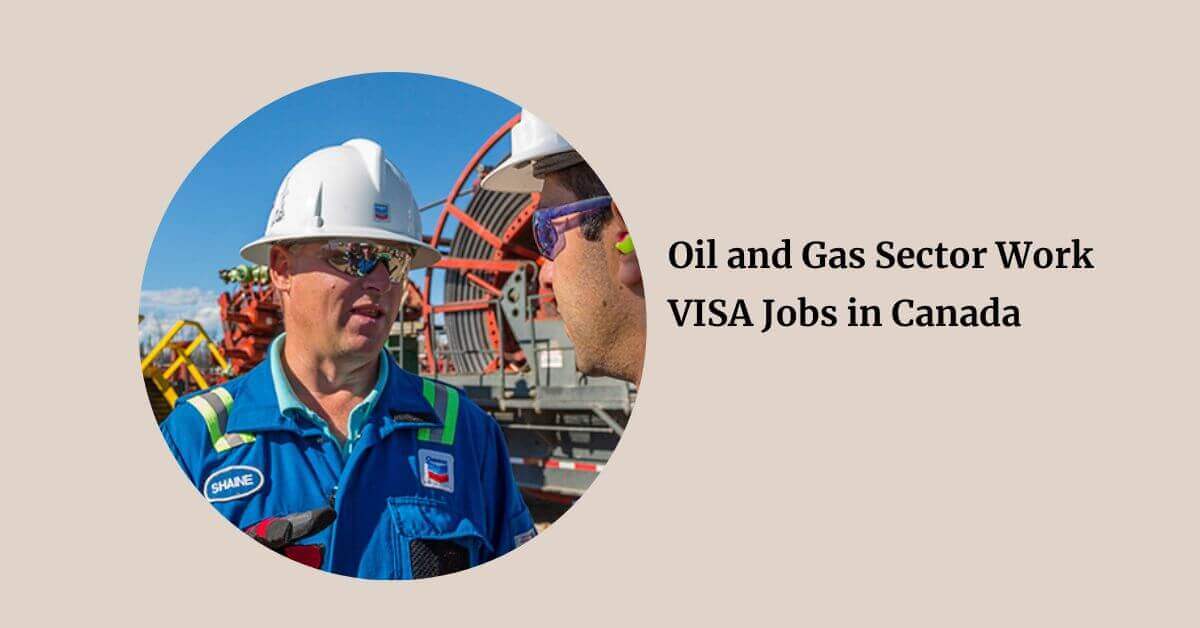Oil and Gas Sector Work VISA Jobs in Canada 2026 offer excellent career opportunities for skilled professionals seeking to work in one of the country’s most lucrative industries. These roles include positions in engineering, drilling, operations, maintenance, safety, and administration, with responsibilities ranging from managing equipment and supervising field operations to ensuring compliance with safety and environmental regulations.
Employees in this sector can expect annual salaries ranging from CAD 60,000 to CAD 120,000, depending on experience, role, and location, along with additional benefits such as health insurance, retirement plans, performance bonuses, and, in many cases, work visa sponsorship for international applicants. Canada’s oil and gas industry in 2026 is expanding, offering stable employment, professional growth, and opportunities to work on large-scale energy projects. Ideal candidates are highly skilled, safety-conscious, and ready to work in challenging and dynamic environments, making these positions ideal for both domestic and foreign professionals.
Check Also: Farm Workers Vegetables in Canada For Foreigners Visa Sponsorship
This article offers a comprehensive examination of the Canadian oil and gas industry, with a particular emphasis on the work visa options available to qualified workers who wish to establish their careers in Canada, as well as the job opportunities, worker shortages, salaries, qualifications, and top employers.
How Big is the Canadian Oil and Gas Sector and How Significant is the Worker Shortage?
Industry Size and Economic Impact: The Canadian oil and gas sector is one of the main industries in the country, contributing significantly to the national GDP. The Trans Mountain Expansion and the Coastal GasLink are significant growth generators, supporting both upstream (exploration and production) and midstream (transportation and storage) activities.
Labor Shortage and Workforce: The sector employs hundreds of thousands of individuals in a variety of fields, including engineering and operations. Nevertheless, the industry is currently facing a substantial labor shortage. This is primarily attributable to the competition for talent from other burgeoning sectors, retirements (often referred to as the Great Crew Change), and an aging workforce.
The critical need for qualified professionals is underscored by reports from organizations such as the Canadian Association of Energy Contractors (CAOEC), which predict a sustained increase in demand for skilled workers through.
Top 10 Oil and Gas Sector Work VISA Jobs in Canada:
The Canadian oil and gas sector is currently experiencing the most severe shortages in the following occupations:
#1: Petroleum Engineers:
- Average Salary: CAD $100,000–$180,000
- Qualifications: Bachelor’s degree in Petroleum Engineering; some roles may require a Professional Engineer (P.Eng.) designation.
2# Geologists:
- Average Salary: CAD $80,000–$160,000
- Qualifications: Bachelor’s or Master’s degree in geology.
3: Mechanical Engineers:
- Average Salary: CAD $75,000–$140,000
- Qualifications: Bachelor’s degree in Mechanical Engineering; Professional Engineer (P.Eng.) designation preferred.
4: Electrical Technicians:
- Average Salary: CAD $60,000–$110,000
- Qualifications: a technical diploma or certificate in electrical technology.
5# Welders:
- Average Salary: CAD $50,000–$95,000
- Qualifications: apprenticeship training or a technical diploma in welding.
6 Drilling Rig Operators:
- Average Salary: CAD $70,000–$120,000
- Qualifications: high school diploma; specific training programs or certifications may be required.
7: Project Managers:
- Average Salary: CAD $100,000–$200,000
- Qualifications: Bachelor’s degree in engineering or business; Project Management Professional (PMP) certification preferred.
8# Safety Advisors:
- Average Salary: CAD $70,000–$130,000
- Qualifications: Bachelor’s degree in Occupational Health and Safety; Canadian Registered Safety Professional (CRSP) certification is often required.
9# IT Specialists with Oil and Gas Experience:
- Average Salary: CAD $80,000–$150,000
- Qualifications: a bachelor’s degree in computer science or a related field.
10# Heavy Equipment Operators:
- Average Salary: CAD $60,000–$100,000.
- Qualifications: high school diploma; relevant certifications for operating heavy machinery.
Benefits of Oil and Gas Sector Jobs:
- High Remuneration: The oil and gas sector is renowned for providing highly competitive compensation, including comprehensive benefits and remuneration. The specialized expertise and skills demanded in this industry frequently result in wages that exceed the average.
- The Potential for Global Opportunities: The worldwide nature of oil and gas operations generates employment opportunities in numerous locations. Whether one is inclined towards domestic or international employment, the sector provides a wide array of prospects for professional growth and journey.
- Career Stability: The oil and gas industry continues to experience a relatively consistent demand for proficient professionals, notwithstanding the volatility of crude prices and market conditions. Employment in critical sectors including engineering, geology, and operations is imperative for the industry’s sustained viability and the maintenance of production levels.
- Technical and professional growth: The oil and gas sector provides ample prospects for ongoing education and the enhancement of one’s skill set. You will have the opportunity to deepen your technical knowledge and expertise, whether you work in refineries, on drilling platforms, or in corporate offices.
- Cutting-Edge Technology: The oil and gas sector is a vanguard of technological innovation, propelling progress in domains including environmental monitoring, reservoir management, and drilling techniques. Engaging in this industry grants access to cutting-edge hardware and software.
- Career Progression and Advancement Opportunities: Oil and gas companies frequently place a high value on internal promotions, thereby offering their employees prospects for professional growth and development. You can ascend to leadership positions within an organization with the proper blend of abilities, experience, and determination.
- Diverse Professions and Functions: The oil and gas sector comprises an extensive array of professional positions and fields of study, such as environmental management, engineering, geosciences, operations, and finance. There is a position that corresponds with your talents and interests, whether you prefer practical fieldwork or strategic decision-making.
- Contribution to Energy Security: The contribution of oil and gas to energy security is substantial, as they serve as fuel for industrial processes, transportation, heating, and electricity generation. Through active participation in the sector, one aids in the preservation of energy reliability and security for economies and communities across the globe.
- Global Impact: The oil and gas industry exerts a substantial influence on trade, geopolitics, and markets, thereby impacting the global economy. Engaging in this field provides the opportunity to contribute to a dynamic and influential sector that possesses extensive ramifications.
- Profound Technical and Logistical Obstacles: Oil and gas occupations frequently demand the resolution of intricate technical and logistical dilemmas, encompassing tasks such as resource extraction and exploration in remote areas, production process optimization, and environmental risk mitigation. Successfully surmounting these obstacles can provide intellectual stimulation and individual satisfaction.
Top 10 Biggest Oil and Gas Companies to Look for Jobs in Canada:
The following ten oil and gas companies in Canada are the largest and continue to recruit qualified and skilled workers through work visa programs. If you are interested in settling in Canada, you can apply for jobs at these companies:
- Suncor Energy: Suncor Energy is the largest integrated energy corporation in Canada, with a focus on the development, refining, and marketing of oil sands.
- Canadian Natural Resources Limited (CNRL): Canadian Natural Resources Limited (CNRL) is one of the world’s greatest independent producers of natural gas and crude oil.
- Cenovus Energy: Cenovus Energy is a significant integrated oil corporation that is dedicated to the development and upgrading of oil sands.
- Imperial Oil: Imperial Energy is a subsidiary of ExxonMobil that is engaged in all facets of the energy and gas industry.
- Enbridge: Enbridge is the largest energy infrastructure corporation in North America, with a focus on transportation and distribution.
- TC Energy: TC Energy is a significant energy infrastructure corporation that operates power generation facilities and pipelines.
- Pembina Pipeline Corporation: Pembina Pipeline Corporation is a premier provider of midstream and transportation services.
- Tourmaline Oil Corp: Tourmaline Oil Corp. is a significant producer of natural gas in Canada.
- Whitecap Resources: Whitecap Resources is an intermediate-sized oil and gas producer that conducts operations in Western Canada.
- ARC Resources: ARC Resources is a company that is dedicated to the responsible development of energy in Western Canada.
Jobs in Canadian Oil and Gas Sector with Easy and Fast-Track Immigration Programs:
In addition to offering excellent lifestyle opportunities and high salaries, Canada’s thriving oil and gas sector also offers a variety of fast-track immigration programs to attract top talent from around the globe. In 2026, there will be five distinct categories of work visas available to qualified workers in the oil and gas sector, which can be used to easily relocate to Canada and participate in this dynamic industry.
1# Global Talent Stream (GTS):
The Global Talent Stream (GTS) is a component of the Temporary Foreign Worker Program (TFWP) that is intended to streamline the hiring procedure for skilled workers. If you are a petroleum engineer or geoscientist, you are classified under Category B of GTS, which is characterized by a rapid processing period of approximately two weeks for work permit applications.
2# Provincial Nominee Programs (PNPs):
Each province in Canada has its own Provincial Nominee Program (PNP) that is specifically designed to attract qualified workers. The Alberta Express Entry Stream and the Saskatchewan Immigrant Nominee Program are programs that not only address labor shortages but also provide a direct pathway to permanent residency.
3# Express Entry:
The Federal Skilled Worker (FSW), Federal Skilled Trades (FST), and Canadian Experience Class (CEC) are among the programs that the Express Entry system administers to manage applications for skilled worker immigration. The Comprehensive Ranking System (CRS) score is the determining factor for your eligibility for permanent residency invitations, resulting in a streamlined process for qualified professionals.
4# Atlantic Immigration Pilot Program (AIPP):
The Atlantic Immigration Pilot Program (AIPP) is a program that assists employers in Atlantic Canada in the recruitment of qualified workers from abroad. This program is especially advantageous for individuals who are interested in employment opportunities in the energy and gas sectors of this region.
5# Intra-Company Transfer (ICT):
The Intra-Company Transfer (ICT) program, which facilitates the seamless transfer of senior managers and specialized knowledge workers to Canadian operations for employees of multinational corporations, promotes international mobility within the industry.
A plethora of opportunities await skilled professionals in the Canadian oil and gas sector. Canada is a top choice for global talent due to its high standard of living, attractive salaries, and a variety of fast-track immigration programs. Embark on a fulfilling career path and make a meaningful contribution to one of Canada’s most critical industries by comprehending the qualifications, salary expectations, and visa options.
Frequently Asked Questions:
Is Canada rich in oil and gas?
The value of Canada’s energy resources is more than 75 times greater than the country’s other natural resources combined, according to new data from Statistics Canada. Led by the oil sands, Canada’s oil, gas, and coal assets were worth $1.6 trillion in 2022, or about $41,000 per Canadian.
What is the salary in the oil and gas industry in Canada?
The average oil and gas salary in Canada is $78,917 per year or $40.47 per hour. Entry-level positions start at $53,625 per year, while most experienced workers make up to $125,000 per year.
How do I work in the oil and gas industry in Canada?
Oil and gas well drillers and servicers must complete three to six months of formal on-the-job training, college- or petroleum industry-approved training courses, and four or more years of work experience in subordinate rig crew positions. A college diploma in drilling may be required.






